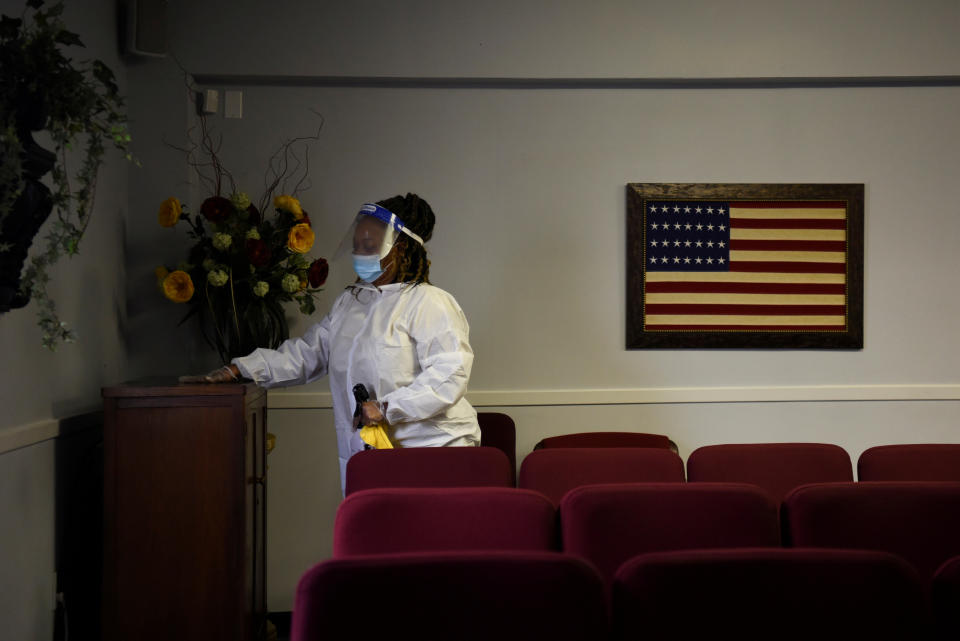The EPA approves long-lasting disinfectant to kill COVID-19, but experts call potential impact 'modest'
Over the past few months, the Environmental Protection Agency has added to its list of disinfectants that are approved for use to kill SARS-CoV-2, the virus that causes COVID-19. But now there’s a new disinfectant that has been approved by the agency — and it has much bigger claims than its predecessors.
It’s called SurfaceWise2, and the EPA says Monday in a press release that it kills coronaviruses like SARS-CoV-2 on surfaces for up to seven days. “After carefully reviewing the available data and information, the agency has determined that the product helps to address the current national emergency,” the press release says. “This product is expected to provide longer-lasting protection in public spaces, increasing consumer confidence in resuming normal air travel and other activities.”

SurfaceWise2, which is made by Allied BioScience, is applied via an electrostatic spraying solution, Maha El-Sayed, chief science officer at Allied BioScience, tells Yahoo Life. “This solution creates a barrier that physically breaks down and kills virus cells continuously, even on high-touch areas,” she says. SurfaceWise2 is a modified version of the original SurfaceWise formula, and provides “additional antiviral properties to continuously kill viruses on surfaces,” she says.
Independent laboratory testing conducted by researchers at the University of Arizona found that the spray killed 99.99 percent of coronaviruses within 10 minutes.
The disinfectant has been granted an emergency exemption to allow American Airlines and Total Orthopedics Sports & Spine, an orthopedics group with several locations in Texas, the ability to use the spray.
The very limited approval is confusing, but there’s a reason for it. EPA administrator Andrew Wheeler explained this on a press call Thursday, noting that the way the Section 18 Emergency Exemption program works is that the EPA reviews an application that must come from states or other federal agencies. In this particular case, the request came from the state of Texas for use by American Airlines and Total Orthopedics’ clinics. If other companies also want to use this product, they would need to apply for an emergency exemption through their state, Wheeler explained. The EPA would then need to look at the surfaces the disinfectant would be applied to and approve it specifically for that use.
“EPA has not received Section 18 applications from any other state for products with residual efficacy against coronaviruses like SARS-CoV-2, but will consider any requests submitted related to the COVID-19 public health emergency,” EPA spokesman Ken Labbe tells Yahoo Life.
The ability to kill SARS-CoV-2 on surfaces for up to seven days is attention-grabbing, but experts say it’s unlikely to do much in stopping the spread of COVID-19. “The majority of the spread of COVID-19 is from person to person when people are in close contact,” Dr. William Schaffner, an infectious disease specialist and professor at the Vanderbilt University School of Medicine, tells Yahoo Life. “Surfaces undoubtedly play a role, but we originally thought they were much more important than they actually seem to be.”
The Centers for Disease Control and Prevention specifically says that “it’s possible” that a person can get COVID-19 by touching a surface or object that has the virus on it and then touching their own mouth, nose or possibly their eyes, but adds, “this is not thought to be the main way the virus spreads.”
But, Schaffner says, “in general, the public really likes reassurance that touchable surfaces have been disinfected, even though touchable surfaces likely play a minor role in the spread of COVID-19.”
It’s possible other disinfectants can also kill the virus for this long — they just haven’t been tested for this, Dr. Amesh A. Adalja, senior scholar at the Johns Hopkins Center for Health Security, tells Yahoo Life. “A lot of disinfectants are effective against SARS-CoV-2,” he says. “But you can’t say a disinfectant is effective at killing SARS-CoV-2 for up to seven days unless you’ve tested it and shown the data to the EPA.”
Schaffner says he expects the new disinfectant to play a “modest” role in helping to reduce the spread of COVID-19. Still, he says, “any facility that has lots of touchable surfaces and is now using a disinfectant might want to look at this. The more careful and meticulous you are, the more this will appeal to the general public.”
Donald W. Schaffner, a professor at Rutgers University who researches quantitative microbial risk assessment and cross-contamination, agrees that this new disinfectant is unlikely to move the needle in terms of COVID-19 case counts. “It’s good that we have another tool in our toolkit, but it’s kind of down on my list of priorities of things that I’m worried about when I go on an airplane,” he tells Yahoo Life. “I think the public health impacts [of the new disinfectant] are minimal.”
Overall, though, Adalja stresses that “lots of different disinfectants are effective against SARS-CoV-2.”
“In general, I don’t think it’s that big of a deal in preventing the spread of COVID-19,” he adds.
For the latest coronavirus news and updates, follow along at https://news.yahoo.com/coronavirus. According to experts, people over 60 and those who are immunocompromised continue to be the most at risk. If you have questions, please reference the CDC’s and WHO’s resource guides.
How to maintain your physical and mental health during the pandemic
Taking care of a loved one with COVID-19? Here’s how to stay healthy
Q&A with Dr. Kavita Patel: How to keep your family safe and maintain your mental health
Read more from Yahoo Life
Want daily lifestyle and wellness news delivered to your inbox? Sign up here for Yahoo Life’s newsletter.

